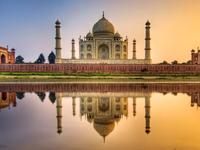

 (at left: David Hill; below right: Reena Esmail)
(at left: David Hill; below right: Reena Esmail)
As well as playing with Schola, the period ensemble Juilliard415 will perform works of J.S. Bach, Telemann, and Rameau.
In addition to the scheduled concerts, Schola will also take part in the Sunday service at historic St. Mary’s Church in Chennai, both the oldest Anglican church and the oldest British building in India. Of special interest to Yale friends, the church was the site of the 1680 marriage of Elihu Yale to Catherine Hynmers, the first marriage recorded there.
The tour also includes school visits in India, providing unique opportunities for musical and cultural exchange, furthering Yale’s and Juilliard’s commitment to international recruitment and fostering worldwide relationships.
See also the tour presenter’s India tour page.
Performances
Delhi
Sunday, March 12 | 6:30 PM
Bahá’í House of Worship
Free; reservations here
Mumbai
Thursday, March 16 | 7:00 PM
National Center for the Performing Arts, Tata Theater
Ticket info here
Chennai
Saturday, March 18 |7:00 PM
Government Museum Theater (Juilliard Only)
Free; reservations here
Sunday, March 19 | 7:00 PM
Sir Mutha Venkatasubba Rao Hall
Ticket info here
*
This Love between Us is a piece about unity. Its seven movements juxtapose the words of seven major religious traditions of India (Buddhism, Sikhism, Christianity, Zoroastrianism, Jainism, Hinduism, and Islam), and specifically how each of these traditions approaches the topic of unity, of brotherhood, of being kind to one another. The texts come either straight from canonical religious writings or from poets who write through the lens of their religion. Each text is itself a union: it is set simultaneously in English and in its original language (with the exception of the Christian text, where the Malayalam is a translation), so you can hear the beauty of the original and grasp its meaning through translation. Each movement also contains a unique combination of Indian and Western classical styles, running the continuum from the Christian movement, which is rooted firmly in a baroque style, to the Zoroastrian movement, which is a Hindustani vilambit bandish. Each of the other movements lives somewhere in between these two musical cultures in their techniques, styles, and forms. But even more than uniting musical practices, this piece unites people from two different musical traditions: a sitar and tabla join the choir and baroque orchestra. Each of the musicians is asked to keep one hand firmly rooted in their own tradition and training, while reaching the other hand outward to greet another musical culture.
This piece is also a union for me. The time I spent studying at both Yale and Juilliard has been the foundation of my career as a Western composer. And my Fulbright year, studying Hindustani music in India, opened my ears and mind to the world of Hindustani classical music. One day in late 2015, after months of pleading with embassies, government officials, and agencies, I finally lost the battle for the visa I needed to return to India, simply because my grandfather had moved his family to Pakistan in the 1950s. I have never been more heartbroken in my life. The pain of being from two places is that, wherever you are, you always miss the other place. And somehow, as if in answer to my despair, the very next day I received the e-mail asking me to write this piece—the one you will hear today. If it is impossible to be in both places at once, or at all, I have strived every day since then to create this hybrid, united world in my music.
I wrote This Love between Us through some of the darkest times in our country and in our world. But my mind always returns to the last line of this piece, the words of Rumi, which are repeated like a mantra over affirming phrases from each religion, as they wash over one another: “Concentrate on the Essence. Concentrate on the Light.”
Note by the composer